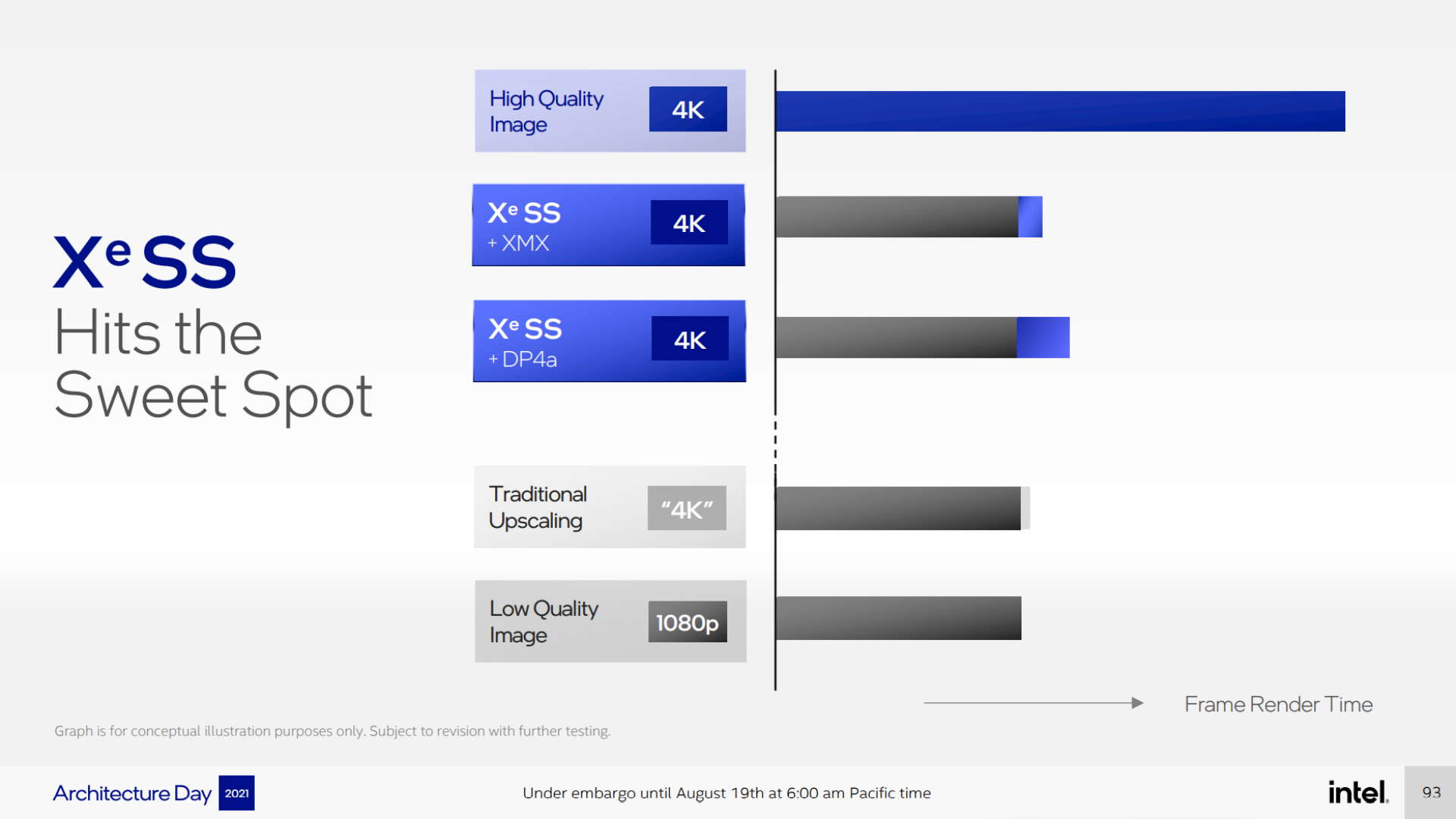Intel XeSS should work on AMD RDNA 2 and Nvidia Ampere, Turing, & Pascal GPUs | PC Gamer - mulhernexpregiat
Intel XeSS should work on AMD RDNA 2 and Nvidia Ampere, Turing, &adenosine monophosphate; Pascal GPUs

Intel XeSS is an AI-augmented upscaling technology Intel hopes will be a feather in the crownwork of its Alchemist graphics cards when they finally go head-to-head with AMD and Nvidia. It's a relatively taken proposition for gamers, non unequal DLSS surgery FidelityFX Super Resolution, but we also know Intel intends to offer this frame rate-boosting engineering science on its competitors' GPUs.
Exactly which competitors' art cards testament benefit from the technology will precipitate to support for DP4A book of instructions.
So let's commence right into the intense of information technology. On Intel Alchemist GPUs, Intel XeSS will work through XMX quickening—specific matrix engines built into the architecture that perform a role alike to that of Nvidia's Tensor Cores. It's this mysterious learning acceleration that'll help XeSS hike up your performance in-game.
For not-Intel Xe-HPG graphics cards, however, this acceleration seat alternatively be done through DP4A operating instructions at a somewhat greater expense (significance it won't be quite as performant as XMX-accelerated XeSS). These DP4A instructions are used to breed 8-bit integers (one byte, INT8) accumulated into one 32-routine integer and past keep going a GPU's ALUs. These are also put-upon to accelerate certain operations that do not require high precision, i.e. large encyclopedism.
Modern GPUs keep going DP4A (Signed Integer Dot-Product of 4 Elements and Accumulate) in line with Microsoft Shader Model 6.4, while new aged GPUs don't. That means some GPUs can speed up certain operating instructions required away XeSS, while others are ineffectual to.
| Computer architecture | Compatible |
|---|---|
| Intel Atomic number 54-HPG | Yes - XMX (inveterate) |
| Intel Xe-LP | Yes - DP4A (confirmed) |
| Older Intel architectures (Gen 11, Gen 9) | No |
| AMD RDNA 2 | Yes - DP4A (official) |
| AMD RDNA | No |
| AMD Vega | No |
| AMD Vega 7nm | Possible - DP4A |
| AMD Polaris | No |
| Nvidia Ampere | Yes - DP4A |
| Nvidia Turing | Yes - DP4A |
| Nvidia Pascal | Yes - DP4A |
| Experienced Nvidia architectures | No |
AMD has confirmed that RDNA 2 art cards support DP4A, in a comment to ComputerBase. This is achieved through Rapid Jam-packed Math, a feature originally introduced with AMD's Vega architecture, though AMD says it's single the RX-6000 serial that volition financial backing DP4A instructions.
You put on't only have to take AMD's word for it; the RDNA 1 ISA citation take [PDF warning] does not list DP4A compatibility, nor does first-gen Vega. While the RDNA 2 pathfinder notes "Dot production ALU operations added accelerate illation and abysmal-learning" equally a feature change with the many recent architecture.
It's meriting noting that 7nm Vega, found within the Radeon Cardinal, lists support for DP4A operations, which could skilled information technology too supports XeSS and owners of that card tooshie finally feel even in purchasing it instead of an RX 5700 XT.

AMD does, however, note that older GPUs may in essence glucinium able to outpouring XeSS on FP32/FP16 ALUs, but this would comprise slower. We'll credibly never uncovering out if that's the case, though, as Intel has already largely shot down a Thomas More common FP32/FP16 carrying out of XeSS in a recent interview with WCCFTech, citing possible operation questions.
I've reached out to AMD for any further clarification on DP4A support and will update this article if I hear anything back.
Onwards to Nvidia, and IT appears that the company's Ampere and Alan Mathison Turin architectures volition support DP4A. Nobelium qualms in that location. As a matter of fact, the Pascal architecture should as wel support DP4A, actually atomic number 3 the first computer architecture to support the didactics for squad green.
This is potentially smashing news for 10-series owners, as Nvidia's own DLSS applied science is supported only happening 20-series RTX cards or newer.
In the same interview, Intel's Karthik Vaidyanathan also states it will not be look to curriculum specifically for Nvidia's Tensor Cores equally that would necessitate bespoke programming.
I've also reached dead set Nvidia to see if it testament share any to a greater extent information on supported GPUs.
As for older Intel kit, it appears that Xe-L-P settled iGPUs found in 11th Gen mobile chips should tolerate the instruction and therefore work with XeSS. I've not seen any evidence to prove any previous iGPUs Beaver State desktop iGPU models will be supported, however, so as far as I'm taken up today the cut-off will be more recent Intel Xe-settled chips.
Still, it's looking suchlike large numbers of older discrete nontextual matter cards will be open to using Intel's XeSS technology. That should be a big get ahead for Intel's applied science, but does depend on it being able to deliver higher frame rates without overly much loss in clarity, even with DP4A finished XMX. Winner testament also swear on biz support, too, and Nvidia has a multi-year start in that regard.
If it every last goes Intel's way, though, XeSS is sure to crank up the pressure on AMD and Nvidia.
Source: https://www.pcgamer.com/intel-xess-compatibility-nvidia-amd/
Posted by: mulhernexpregiat.blogspot.com



0 Response to "Intel XeSS should work on AMD RDNA 2 and Nvidia Ampere, Turing, & Pascal GPUs | PC Gamer - mulhernexpregiat"
Post a Comment